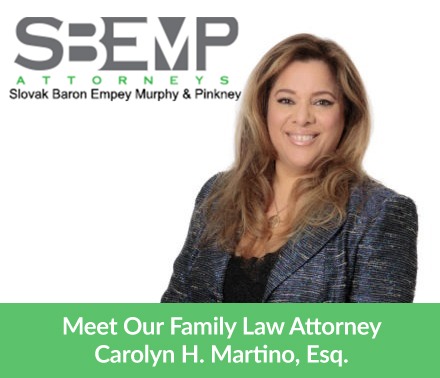
As seen on Credit.com:
Estate planning is the process of establishing a framework to manage your assets upon death, disability or incapacity. It involves creating documents that outline your wishes. While estate planning is not a pleasant task, it is critical that you implement it before you need it.
Here are critical documents and things necessary to cover the aspects of a well-devised estate plan.
- Last Will & Testament / Living Will
- Establish a Living Trust
- Power of Attorney for Your Estate and Healthcare
- HIPAA Release
- Letter of Intent
- Update Your Beneficiaries
- Secure Your Digital Assets
- Plan Final Arrangements
- Make Copies of All Your Documents and Store in a Safe Place
- Talk to Your Family and Friends About the Details
Read more:
https://www.credit.com/blog/7-documents-you-need-to-fill-out-before-you-die-164157/
Need Help with Estate Planning? Contact Us
For more information or to request a consultation please contact the law offices of SBEMP (Slovak, Baron, Empey, Murphy & Pinkney) by clicking here.
SBEMP LLP is a full service law firm with attorney offices in Palm Springs (Palm Desert, Inland Empire, Rancho Mirage), CA; Indian Wells, CA; Costa Mesa (Orange County), CA; San Diego, CA; New Jersey, NJ; and New York, NY.
DISCLAIMER: This blog post does not constitute legal advice, and no attorney-client relationship is formed by reading it. This blog post may be considered ATTORNEY ADVERTISING in some states. Prior results do not guarantee a similar outcome. Additional facts or future developments may affect subjects contained within this blog post. Before acting or relying upon any information within this newsletter, seek the advice of an attorney.
Family Law – Divorce, Child Custody, Alimony Support & More
 Family law is the body of law pertaining to familial relationships. It involves the creation of family relationships and dissolving them through a divorce as well as the termination of parental rights. These laws encompass adoption, child custody issues, and child support obligations.
Family law is the body of law pertaining to familial relationships. It involves the creation of family relationships and dissolving them through a divorce as well as the termination of parental rights. These laws encompass adoption, child custody issues, and child support obligations.
The team of committed attorneys at SBEMP (Slovak, Baron, Empey, Murphy & Pinkney) law firm provides professional legal advice and services to clients in Palm Springs, Palm Desert, Rancho Mirage, Inland Empire, Orange County, San Diego, New Jersey, New York, and surrounding locations.
Divorce Law
Divorce regulations vary between states. All states allow for a no-fault divorce while some states mandate a separation period. A majority of states have residency requirements to prevent people seeking a divorce by filing in a state with the most conducive law.
Every state has their specific guidelines on the division of the marital assets and debts. However, the rules are similar in all states. Typically, the court seeks to make an equitable division of the assets. But this does not necessarily imply that things can be equally divided.
The court may assess the parties’ contributions to the marriage, duration of the marriage, and the requirements of each party following the divorce. The court will also take into account misconduct such as domestic abuse or infidelity while making a decision.
Alimony and Spousal Support Law
Alimony and spousal support is an often contested area in a divorce case. Certain states employ a formula to decide on the amount of support while others leave it to the discretion of the judge. In cases where the court utilizes a formula, it is still imperative to ensure that the court enters the correct inputs to decide the right amount of support.
Child Custody Law
Child custody is a highly debated area of family law. A majority of states arrive at child custody and parenting time decisions keeping in mind the child’s best interest.
The court assesses facets such as which parent is more bonded with the child, whether each parent has a stable home, and whether either parent has an extensive criminal record or substance abuse problems.
In case parents agree on custody, the court typically follows the agreement. However, if the parents cannot agree on this matter, family law attorneys present the court with evidence on the best interests of the child.
Child Support Law
Children have the right to receive support from both parents. Child support aims to provide children with parents living separately with the same financial resources that they would have access to if both parents lived together. The courts presume that the parent caring for the child provides support to the child in a direct manner.
Child support is mainly determined by a formula, and each state has its own formula for calculating child support.
Abuse and Neglect Proceedings Law
Family law also addresses abuse and neglect. If a state believes that a parent is not providing proper care to a child, they may start abuse and neglect proceedings. They may represent a child or a parent accused of abuse or neglect.
In abuse and neglect proceedings, family lawyers assist clients in either defense against allegations of abuse or neglect or assist their clients to comply with services and other regulations to regain child custody.
Compassionate lawyers at the SBEMP law firm serve clients from Palm Springs, Palm Desert, Rancho Mirage, Inland Empire, Orange County, San Diego, New Jersey, New York, and nearby locations for a range of legal practice areas.
 Have any legal questions? Contact SBEMP:
Have any legal questions? Contact SBEMP:
For more information or to request a consultation please contact the law offices of SBEMP (Slovak, Baron, Empey, Murphy & Pinkney) by clicking here.
SBEMP LLP is a full service law firm with attorney offices in Palm Springs (Palm Desert, Inland Empire, Rancho Mirage), CA; Indian Wells, CA; Costa Mesa (Orange County), CA; San Diego, CA; New Jersey, NJ; and New York, NY.
DISCLAIMER: This blog post does not constitute legal advice, and no attorney-client relationship is formed by reading it. This blog post may be considered ATTORNEY ADVERTISING in some states. Prior results do not guarantee a similar outcome. Additional facts or future developments may affect subjects contained within this blog post. Before acting or relying upon any information within this newsletter, seek the advice of an attorney.
 Energy law is an area of law that focuses on the creation, enforcement, and discussion on laws that regulate the use of energy. This is vital as America becomes energy self-sufficient and certain parts of the country and states are making billions off of oil shale and so on.
Energy law is an area of law that focuses on the creation, enforcement, and discussion on laws that regulate the use of energy. This is vital as America becomes energy self-sufficient and certain parts of the country and states are making billions off of oil shale and so on.
Laws are Essential
There are laws for creating and harvesting energy as well as those that regulate energy use taxation. Both the public and energy companies must follow energy laws as they are associated with the sale, use, and conservation of energy resources.
Many people are oblivious to how energy laws affect their routine life. Putting fuel in a vehicle or renewing license plates involves paying taxes and fees to the state.
The power supplied to homes from a power plant involves the energy company following energy regulations to conduct business. Energy laws exist at the federal, state, and local levels and these laws even affect international relations.
Dedicated lawyers at SBEMP (Slovak, Baron, Empey, Murphy & Pinkney) law firm provides professional legal advice and services to clients in Palm Springs, Palm Desert, Rancho Mirage, Inland Empire, Orange County, San Diego, New Jersey, New York, and surrounding communities.
Energy Law and Property Law
Energy laws create a link between property owners and the energy companies willing to harvest resources and supply them to consumers. There is a cross between energy laws and property and contract laws on the terms on which utility companies can enter a property to harvest energy or deliver utilities to clients.
Common law stipulated that property owners had control over the area beneath their land to the center of the earth. They also controlled the space over their land into outer space. But in the United States v Causby case, the US Supreme Court ruled that there are practical limitations to these common-law theories of property law.
Attorneys help their clients with issues related to energy such as energy harvesting, and low-altitude flights as well as other inconvenient activities. They assist their clients in comprehending utility easements and develop the best approaches to deliver energy to consumers.
Regardless of whether they represent a property owner or an energy corporation, lawyers assist their clients in negotiating the conditions for the sale or lease of oil and gas rights on the property.
Energy corporations must be compliant with federal and state laws. Companies require attorneys on site to comprehend their needs, manage negotiations, and undertake the regulatory filings at the federal, state and local levels.
An Evolving Area of Law
The policies of the Department of Energy can change rapidly. Energy lawyers assist their clients in the implementation of these changes. This enables a client to remain in compliance with federal and state laws and conduct their business lawfully.
Attorneys also help their clients with formal hearings and litigations in case of disagreements regarding the compliance with laws and agreements pertaining to energy generation and use.
Energy Law is Complex and Dynamic
Energy law is more relevant today than ever before. Therefore, energy law attorneys have the opportunity to assist their clients in meeting their business goals while remaining compliant with the law.
They can also impact public policy and international relations. The field of energy law can be enjoyable for lawyers who enjoy practicing in a dynamic and complex landscape.
Competent attorneys at the SBEMP law firm serve clients from Palm Springs, Palm Desert, Rancho Mirage, Inland Empire, Orange County, San Diego, New Jersey, New York, and nearby locations for a range of legal practice areas.For more information or to request a consultation please contact the law offices of SBEMP (Slovak, Baron, Empey, Murphy & Pinkney) by clicking here.
SBEMP LLP is a full service law firm with attorney offices in Palm Springs (Palm Desert, Inland Empire, Rancho Mirage), CA; Costa Mesa (Orange County), CA; San Diego, CA; New Jersey, NJ; and New York, NY.
DISCLAIMER: This blog post does not constitute legal advice, and no attorney-client relationship is formed by reading it. This blog post may be considered ATTORNEY ADVERTISING in some states. Prior results do not guarantee a similar outcome. Additional facts or future developments may affect subjects contained within this blog post. Before acting or relying upon any information within this newsletter, seek the advice of an attorney
Trust Case Summary:

As a result of the intervention of SBEMP, a recent court decision ordered a co-trustee in violation of fiduciary duties be removed from his position as Co-Trustee of the Trust.
Case Background:
BN’s brother died, leaving a trust naming her and his roommate (with whom he did not have a legal relationship) as Co-Trustees; and granting the roommate, WM, a life estate to remain in the house.
After several violations of fiduciary duties, BN petitioned to remove WM as a co-trustee.
The fiduciary violations included; but were not limited to: falsifying the decedent’s death certificate, with the intention of divesting the Trust beneficiaries from their inheritances; preventing BN from administering the Trust and performing her trustee duties (e.g., accessing the Trust-owned real property and documentation relating to the other trust assets and its obligations); and engaging in a campaign of hostility toward BN and the other Trust beneficiaries.
WM admitted he falsified his relationship on the death certificate and interfered with administration by not giving BN access to the information.
Decision:
The court ordered that WM provide BM with all information in his control necessary to determine the assets of the Trust, income of the Trust, expenditures of the Trust, and expenses of the Trust for proper accounting.
The court ordered WM to allow access to the property sufficient to allow BN, or her designated agent, to photograph or video record the property and all of its contents for the purpose of identifying and marshaling the assets of the Trust and to allow for a proper appraisal and accounting.
The court also removed WM as Co-Trustee of the Trust and BN is appointed sole Trustee.
For more information or to request a consultation please contact the law offices of SBEMP (Slovak, Baron, Empey, Murphy & Pinkney) by clicking here.
SBEMP LLP is a full service law firm with attorney offices in Palm Springs (Palm Desert, Inland Empire, Rancho Mirage), CA; Costa Mesa (Orange County), CA; San Diego, CA; New Jersey, NJ; and New York, NY.
DISCLAIMER: This blog post does not constitute legal advice, and no attorney-client relationship is formed by reading it. This blog post may be considered ATTORNEY ADVERTISING in some states. Prior results do not guarantee a similar outcome. Additional facts or future developments may affect subjects contained within this blog post. Before acting or relying upon any information within this article, seek the advice of an attorney.
Special Needs Trusts
 Most parents want to leave assets to their children when they die. If an individual with a significant cognitive disability receives assets, they may not have the capacity to make good decisions about how those assets are used and they may become ineligible for important federal and state resources and services. The individual can lose Social Security Income (SSI) and Medicaid and the assets may also be subject to recoupment by Medicaid (a.k.a., Medi-Cal) or by the State if the individual is receiving residential services.
Most parents want to leave assets to their children when they die. If an individual with a significant cognitive disability receives assets, they may not have the capacity to make good decisions about how those assets are used and they may become ineligible for important federal and state resources and services. The individual can lose Social Security Income (SSI) and Medicaid and the assets may also be subject to recoupment by Medicaid (a.k.a., Medi-Cal) or by the State if the individual is receiving residential services.
Upon realizing this, parents decide to disinherit the child with disabilities, leaving everything to the non-disabled children with verbal instructions to use part of the inheritance for the benefit of the sibling with disabilities. While this may appear to be a good idea, it can have equally negative results.
For example, the non-disabled child may not use the inheritance on their sibling’s behalf, and is under no legal obligation to do so. Even if the non-disabled sibling uses the assets exactly as the parents intended, they can be claimed by creditors, can have negative tax consequences on the non-disabled sibling, and can be subject to equitable distribution in the event of divorce.
Avoid Negative Consequences
To avoid these negative consequences, it is recommended that parents establish a special needs trust. A special needs trust can protect the assets while; at the same time, making the assets available to protect and enrich the life of the person with a disability without jeopardizing benefits available from the government. A special needs trust is a unique legal document that contains a set of instructions describing how assets placed into trust will be administered on behalf of a person with a disability. It must be carefully worded and is best written by professionals familiar with disability services and programs.
Parents and other family members can use a special needs trust to hold assets for a disabled person. Even families with modest assets should establish a trust; typically, such trusts are not funded until one or both parents die. A special needs trust can be funded through life insurance or estate assets distributed through one’s Will. So long as the assets have never vested in the person with a disability, the special needs trust need not contain a provision reimbursing Medicaid and other providers.
Trust Funds Law
Trust funds can be used to purchase independent professional opinions as necessary, fill in gaps in services, provide additional recreation and other amenities, pay for a private residential placement or buy a vehicle used to transport the beneficiary of the trust.
At the death of the beneficiary, any remaining trust property is disposed according to the instructions written in the trust document by the donor. For example, property might go to other family members or to a charity. SBEMP, LLP frequently works with families to establish special needs trusts as part of their estate plan.
The governing regulations for special needs trusts can be found at 42 U.S.C. § 1396p.
For more information or to request a consultation please contact the law offices of SBEMP (Slovak, Baron, Empey, Murphy & Pinkney) by clicking here.
SBEMP LLP is a full service law firm with attorney offices in Palm Springs (Palm Desert, Inland Empire, Rancho Mirage), CA; Costa Mesa (Orange County), CA; San Diego, CA; New Jersey, NJ; and New York, NY.
DISCLAIMER: This blog post does not constitute legal advice, and no attorney-client relationship is formed by reading it. This blog post may be considered ATTORNEY ADVERTISING in some states. Prior results do not guarantee a similar outcome. Additional facts or future developments may affect subjects contained within this blog post. Before acting or relying upon any information within this article, seek the advice of an attorney.
Probate is the legal method by that the fiduciary (executor) of the estate ultimately settles all affairs of a deceased dearest. It is typically more sophisticated for the executor of an estate, who has a fiduciary obligation and who has been entrusted with the responsibility of overseeing an estate’s assets while facilitating the methodical process of probating the estate.
The probate court process is how an estate handles the settlement of the distribution of property. The process can be hard to handle on your own. When you don’t have a probate attorney or expert, it can be completely impossible. The entire estate can get tied up in the courts. If you’re asking the question of when to get a probate attorney, the answer is as soon as your loved one passes. If you can, it’s best to have it all arranged prior to your loved one’s passing.
Case update from the NJ State Bar Association:
38-2-5185
In the Matter of the Estate of Mary Jane Lynch, N.J. Super. App. Div. (Suter, J.A.D.) (19 pp.)
Decedent executed a will and declaration of trust wherein her personal property was to be equally distributed to her two children, appellant-daughter and appellee-son. The residuary estate was left to the family trust and the assets there were divided equally between the siblings. (more…)
What is Probate?
The term ‘probate’ means ‘proof.’ The term probate in the legal system is proof that the will is ironclad in a court of law. A separate court, called probate court, examines the will to determine how ironclad it is. Strong wills divide assets based on what the deceased wanted. Wills with loopholes, no wills, or wills that excludes assets will follow the rules based on state probate laws. (more…)
